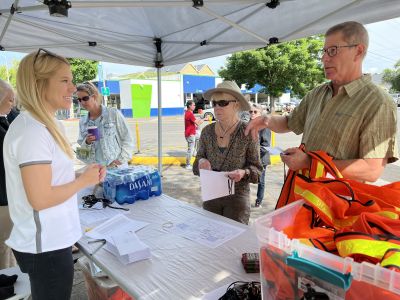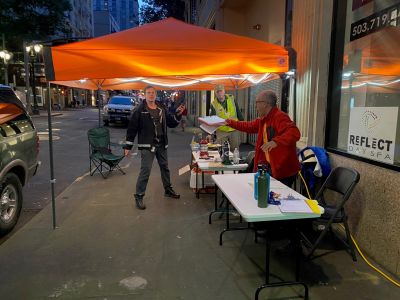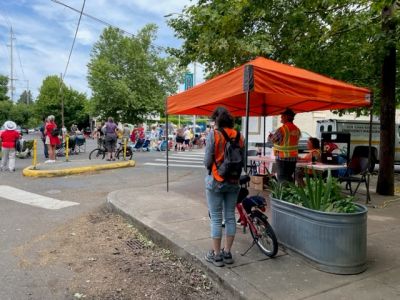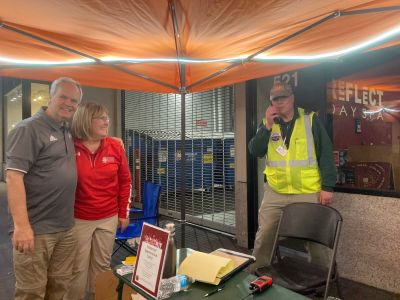JOB AID: Event VCC Lead: Difference between revisions
(Created page with "x") |
mNo edit summary |
||
| (37 intermediate revisions by the same user not shown) | |||
| Line 1: | Line 1: | ||
x | [[File:ParadeAccessVol2.jpg|alt=The Volunteer Coordination Center (VCC)|thumb|400x400px|''The Volunteer Coordination Center (VCC)'']] | ||
[[File:2023.06.03.Starlight.VCC.jpg|alt=Be well prepared and have as much fun at the VCC as these dorks.|thumb|400x400px|''Be well prepared and have as much fun at the VCC as these dorks.'']] | |||
The purpose of this article is to prep staff to serve as the Lead at a Volunteer Coordination Center (VCC) during a parade event. The Lead is the on-site volunteer manager and leads/assists with communications coordination. | |||
<p><span style="color:#ffffff">...</span></p> | |||
__TOC__ | |||
<p><span style="color:#ffffff">...</span></p> | |||
== VCC Preparations == | |||
Notes for development: | |||
* For each parade, an Ops Plan and a map. Would be best to have on a single sheet, tabloid size, color, map on one side and ops plan on the other. | |||
* Set up volunteer list that has name and cell phone number. First part of checking in is to confirm cell number. | |||
* In Smartsheet, use template with check in/check out features. Make sure to give the ECC access to the Smartsheet so they can monitor. | |||
<p><span style="color:#ffffff">...</span></p> | |||
== VCC Lead KSAs and Equipment == | |||
=== VCC Key Skills and Abilities === | |||
'''A VCC Lead should have training and experience in:''' | |||
# Communications management, particularly experience with whatever radio(s) the volunteers and ECC use for the event; | |||
# Volunteer management. | |||
'''''Supplemental'' (non-critical) KSAs include:''' | |||
* Incident Command System (ICS) experience; | |||
* Mental health crisis de-escalation; | |||
* First aid certification (or higher). | |||
<p><span style="color:#ffffff">...</span></p> | |||
=== '''Recommended personal equipment:''' === | |||
* '''Radios''' '''and extra batteries:''' If the ECC is activated, check out an 800 MHz and make sure it is fully charged. If volunteers will operate on FRS/GMRS, bring one FRS/GMRS radio for each channel they may simultaneously communicate on so you can monitor all frequencies (for example: if they will use two channels and have two backup channels, you need two radios). | |||
* '''Weather appropriate clothing:''' Be sure to check that weather forecast before your shift! | |||
* '''Camp chair or camp stool:''' You might regret it if you don't bring one. If you're bringing chairs for the VCC area, you probably won't need one. | |||
* '''Weather relevant supplies:''' If it's gonna be hot and sunny, make sure you have some shade, sunglasses, and sunscreen. If it's going to rain, make sure you have watertight footwear and a rain poncho or umbrella (and preferably some cover). | |||
<p><span style="color:#ffffff">...</span></p> | |||
== VCC Planning == | |||
[[File:Jr. Parade2 2023.06.07.jpg|alt=2023.06.07 Junior Rose Parade. Photo credit: Ernest Jones.|thumb|400x400px|''2023.06.07 Junior Rose Parade. Photo credit: Ernest Jones.'']] | |||
=== Printouts === | |||
Consider any printouts that may need to go to the volunteers: maps, operations plans, etc. At the very least, volunteers should have in a handout all the info they need in order to contact the VCC from the field to ask questions and report emergencies. | |||
=== Everbridge and Push Notifications === | |||
For an exceptionally large event, consider uploading the names and cell phone numbers of all volunteers into a push notification service such as Everbridge. A push notification may be used to report parade position or call for an emergency evacuation of posts. | |||
<p><span style="color:#ffffff">...</span></p> | |||
== The Volunteer Coordination Center (VCC) == | |||
Physically, the VCC is located just off the parade route. The purpose of a VCC is to: | |||
# Coordinate volunteer communications (via radio or other means); | |||
# Communicate with the ECC if it activated for the event; | |||
# Distribute resources to volunteers (e.g. water, PPE, etc.); | |||
# Check in and check out volunteers. | |||
<p><span style="color:#ffffff">...</span></p> | |||
=== VCC Setup === | |||
It is generally not the responsibility of the VCC Lead to set up or tear down the VCC itself. However, that might emerge as part of the Lead's responsibilities if the event organizers are under-resourced and/or PBEM is taking the lead. If that is the case, recommended equipment includes: | |||
* A 10' x 10' canopy; | |||
* One folding table for every two people expected in the VCC; | |||
* One chair for each person expected in the VCC; | |||
* Clipboards, pens, scratch paper; | |||
* A notepad you can use as a log or [https://training.fema.gov/emiweb/is/icsresource/assets/ics%20forms/ics%20form%20214,%20activity%20log%20(v3.1).pdf ICS 214]; | |||
* Laptop and MiFi; | |||
* Water; | |||
* Generator (run off of propane if possible...fewer fumes that way) AND extension cord; | |||
* String lights or other light source if the event will take place at night. | |||
[[File:Lights.jpg|alt=VCC during the 2023 Starlight Parade.|thumb|400x400px|''VCC during the 2023 Starlight Parade. Note the use of the string light in the canopy supports to help create a welcoming and defensive area.'']] | |||
<p><span style="color:#ffffff">...</span></p> | |||
=== VCC Security === | |||
Do consider security at the VCC. Activities at the VCC, particularly when volunteers are checking in and checking out, can be distractingly busy. While you and volunteers are working hard, opportunistic bad actors could be eyeing personal backpacks or expensive equipment, such as a generator. | |||
If there are concerns about security, the VCC Lead should detail an additional volunteer to simply keep watch (and do nothing else). Most prospective thieves will be discouraged when it's clear that someone is keeping an eye out. If the event takes place at night for any duration, be prepared with lights. Good lighting creates a defensive area, is a psychological deterrent to criminal intent, and creates a safer space overall. | |||
Remember that safety is the number one priority. VCC staff should not risk physical confrontations to prevent a theft. Instead, radio the incident in to the ECC to request help from nearby police officers. | |||
<p><span style="color:#ffffff">...</span></p> | |||
=== VCC Roles === | |||
Well before the event, the VCC Lead should consider what other roles they need present at the VCC. The Lead should not leave the VCC post (unless a safety reason demands they move out), and will '''never''' be alone. If a VCC Lead must, they will detail at least one Parade Guide to the VCC before the VCC Lead is left alone. Roles that the VCC Lead should consider include: | |||
*'''Check-in/Check-out:''' Specializes in checking in the Parade Guides when they arrive at the post and giving them their barricade assignment. When a Parade Guide checks out, the person(s) in this role can accept the check-out either in person or by radio. | |||
*'''Tactical Radio Lead:''' Monitors the FRS frequency Parade Guides are speaking on and moves the frequency if necessary. | |||
*'''Runners:''' Can run critical messages to a barricade if the Parade Guide at a location is not available by cell phone or radio. Runners can also take over for Parade Guides who need to leave post to use the restroom. Best detailed to a volunteer who brought a bike. If there are pairs of Parade Guides at barricades, then two runners on bikes is often enough for a large parade. | |||
*'''Lookout:''' Detailed to keep a security eye out at the VCC so others at the VCC are not distracted by prospective bad actors. Well suited to a volunteer with de-escalation training or skills. | |||
<p><span style="color:#ffffff">...</span></p> | |||
== VCC Timeline == | |||
As a general rule, the VCC will be busiest '''''just before and just after''''' the event. VCC staff should plan accordingly. | |||
# '''VCC setup:''' Setup should take place no later than 30 minutes before Parade Guide check-in time. Note, however, that many volunteers are likely to arrive early. This could mean you have no pause between setup and volunteer check-in. Also, use this period to assign VCC call signs to VCC staff if they'll be on radio (e.g. VCC 1, VCC 2, etc). | |||
# '''Volunteer check-in:''' Depending on the size of the event, the check-in period should take about a half hour as well. Depending on the event, check-ins may take place in person or remotely (e.g. over radio or phone from a pre-assigned post). When volunteers check in in person, distribute any copies of the Ops Plan and maps, and confirm communications information such as the volunteer's cell phone number and radio channel. | |||
# '''Event period:''' Generally, this is a relatively slow time and a good opportunity to take a break, eat food, consolidate notes, etc. It is also good practice to use this time to check in with volunteers over radio to see how they're doing. | |||
# '''Volunteer check-out:''' If the event is a parade, try to schedule rolling check-outs (having volunteers close their posts as the tail of the parade goes by) to make check-outs less chaotic and confusing. We let volunteers check out remotely over radio or phone if they have nothing that needs to be returned to the VCC. It's important to make sure ALL volunteers confirm check out, for as many as possible. | |||
# '''VCC breakdown:''' Once all volunteers are checked out, break down and load VCC equipment and head back to the ECC. | |||
<p><span style="color:#ffffff">...</span></p> | |||
== VCC Improvement Plan Ideas == | |||
* Try to eliminate the use of cell phone as much as possible; explore training on and using an app like Zello. | |||
* Pre-assign all the less desirable posts, consider adding some sort of incentive. | |||
* Make sure Uber and Lyft are not trying to get into the parade area...send a message to them ahead of time. | |||
* Set up ECC to help with check-outs by cell phone. Also, can the ECC be used to take calls by cell? (staff with a NET) | |||
* If we have to use cell phones to communicate, can we get a couple to use? | |||
* Find runners ahead of time and identify a couple NETs with bikes, and have them arrive a little later. | |||
Latest revision as of 19:03, 10 June 2023
The purpose of this article is to prep staff to serve as the Lead at a Volunteer Coordination Center (VCC) during a parade event. The Lead is the on-site volunteer manager and leads/assists with communications coordination.
...
...
VCC Preparations
Notes for development:
- For each parade, an Ops Plan and a map. Would be best to have on a single sheet, tabloid size, color, map on one side and ops plan on the other.
- Set up volunteer list that has name and cell phone number. First part of checking in is to confirm cell number.
- In Smartsheet, use template with check in/check out features. Make sure to give the ECC access to the Smartsheet so they can monitor.
...
VCC Lead KSAs and Equipment
VCC Key Skills and Abilities
A VCC Lead should have training and experience in:
- Communications management, particularly experience with whatever radio(s) the volunteers and ECC use for the event;
- Volunteer management.
Supplemental (non-critical) KSAs include:
- Incident Command System (ICS) experience;
- Mental health crisis de-escalation;
- First aid certification (or higher).
...
Recommended personal equipment:
- Radios and extra batteries: If the ECC is activated, check out an 800 MHz and make sure it is fully charged. If volunteers will operate on FRS/GMRS, bring one FRS/GMRS radio for each channel they may simultaneously communicate on so you can monitor all frequencies (for example: if they will use two channels and have two backup channels, you need two radios).
- Weather appropriate clothing: Be sure to check that weather forecast before your shift!
- Camp chair or camp stool: You might regret it if you don't bring one. If you're bringing chairs for the VCC area, you probably won't need one.
- Weather relevant supplies: If it's gonna be hot and sunny, make sure you have some shade, sunglasses, and sunscreen. If it's going to rain, make sure you have watertight footwear and a rain poncho or umbrella (and preferably some cover).
...
VCC Planning
Printouts
Consider any printouts that may need to go to the volunteers: maps, operations plans, etc. At the very least, volunteers should have in a handout all the info they need in order to contact the VCC from the field to ask questions and report emergencies.
Everbridge and Push Notifications
For an exceptionally large event, consider uploading the names and cell phone numbers of all volunteers into a push notification service such as Everbridge. A push notification may be used to report parade position or call for an emergency evacuation of posts.
...
The Volunteer Coordination Center (VCC)
Physically, the VCC is located just off the parade route. The purpose of a VCC is to:
- Coordinate volunteer communications (via radio or other means);
- Communicate with the ECC if it activated for the event;
- Distribute resources to volunteers (e.g. water, PPE, etc.);
- Check in and check out volunteers.
...
VCC Setup
It is generally not the responsibility of the VCC Lead to set up or tear down the VCC itself. However, that might emerge as part of the Lead's responsibilities if the event organizers are under-resourced and/or PBEM is taking the lead. If that is the case, recommended equipment includes:
- A 10' x 10' canopy;
- One folding table for every two people expected in the VCC;
- One chair for each person expected in the VCC;
- Clipboards, pens, scratch paper;
- A notepad you can use as a log or ICS 214;
- Laptop and MiFi;
- Water;
- Generator (run off of propane if possible...fewer fumes that way) AND extension cord;
- String lights or other light source if the event will take place at night.
...
VCC Security
Do consider security at the VCC. Activities at the VCC, particularly when volunteers are checking in and checking out, can be distractingly busy. While you and volunteers are working hard, opportunistic bad actors could be eyeing personal backpacks or expensive equipment, such as a generator.
If there are concerns about security, the VCC Lead should detail an additional volunteer to simply keep watch (and do nothing else). Most prospective thieves will be discouraged when it's clear that someone is keeping an eye out. If the event takes place at night for any duration, be prepared with lights. Good lighting creates a defensive area, is a psychological deterrent to criminal intent, and creates a safer space overall.
Remember that safety is the number one priority. VCC staff should not risk physical confrontations to prevent a theft. Instead, radio the incident in to the ECC to request help from nearby police officers.
...
VCC Roles
Well before the event, the VCC Lead should consider what other roles they need present at the VCC. The Lead should not leave the VCC post (unless a safety reason demands they move out), and will never be alone. If a VCC Lead must, they will detail at least one Parade Guide to the VCC before the VCC Lead is left alone. Roles that the VCC Lead should consider include:
- Check-in/Check-out: Specializes in checking in the Parade Guides when they arrive at the post and giving them their barricade assignment. When a Parade Guide checks out, the person(s) in this role can accept the check-out either in person or by radio.
- Tactical Radio Lead: Monitors the FRS frequency Parade Guides are speaking on and moves the frequency if necessary.
- Runners: Can run critical messages to a barricade if the Parade Guide at a location is not available by cell phone or radio. Runners can also take over for Parade Guides who need to leave post to use the restroom. Best detailed to a volunteer who brought a bike. If there are pairs of Parade Guides at barricades, then two runners on bikes is often enough for a large parade.
- Lookout: Detailed to keep a security eye out at the VCC so others at the VCC are not distracted by prospective bad actors. Well suited to a volunteer with de-escalation training or skills.
...
VCC Timeline
As a general rule, the VCC will be busiest just before and just after the event. VCC staff should plan accordingly.
- VCC setup: Setup should take place no later than 30 minutes before Parade Guide check-in time. Note, however, that many volunteers are likely to arrive early. This could mean you have no pause between setup and volunteer check-in. Also, use this period to assign VCC call signs to VCC staff if they'll be on radio (e.g. VCC 1, VCC 2, etc).
- Volunteer check-in: Depending on the size of the event, the check-in period should take about a half hour as well. Depending on the event, check-ins may take place in person or remotely (e.g. over radio or phone from a pre-assigned post). When volunteers check in in person, distribute any copies of the Ops Plan and maps, and confirm communications information such as the volunteer's cell phone number and radio channel.
- Event period: Generally, this is a relatively slow time and a good opportunity to take a break, eat food, consolidate notes, etc. It is also good practice to use this time to check in with volunteers over radio to see how they're doing.
- Volunteer check-out: If the event is a parade, try to schedule rolling check-outs (having volunteers close their posts as the tail of the parade goes by) to make check-outs less chaotic and confusing. We let volunteers check out remotely over radio or phone if they have nothing that needs to be returned to the VCC. It's important to make sure ALL volunteers confirm check out, for as many as possible.
- VCC breakdown: Once all volunteers are checked out, break down and load VCC equipment and head back to the ECC.
...
VCC Improvement Plan Ideas
- Try to eliminate the use of cell phone as much as possible; explore training on and using an app like Zello.
- Pre-assign all the less desirable posts, consider adding some sort of incentive.
- Make sure Uber and Lyft are not trying to get into the parade area...send a message to them ahead of time.
- Set up ECC to help with check-outs by cell phone. Also, can the ECC be used to take calls by cell? (staff with a NET)
- If we have to use cell phones to communicate, can we get a couple to use?
- Find runners ahead of time and identify a couple NETs with bikes, and have them arrive a little later.



